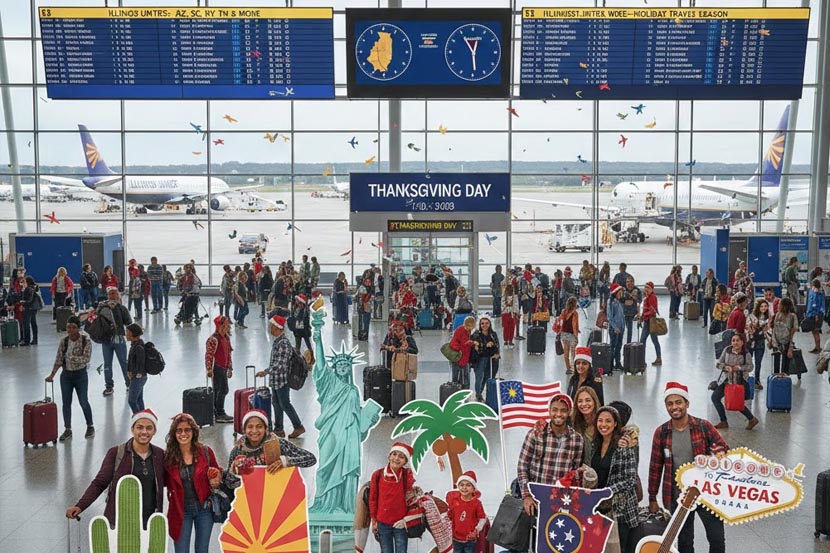
Illinois Unites Arizona, South Carolina, New York, Tennessee, Nevada and Other US States Transforming This Year Holiday Travel Season as Thanksgiving Day Tourism Boosting Revenue and Economy
Illinois unites with Arizona, South Carolina, New York, Tennessee, Nevada, and others, Illinois is seeing a remarkable surge in domestic tourism, with visitors flocking to major cities and attractions. As the Thanksgiving Day tourism boom continues, the state of Illinois is benefiting from increased travel spending, which is helping strengthen the local economy. With an influx of tourists visiting iconic landmarks, cultural events, and vibrant urban areas like Chicago, Illinois is proving to be a key player in the national tourism economy.
As the holiday travel season unfolds, the economic impact of Thanksgiving Day tourism becomes even more evident in states like Illinois, New York, and Nevada. These states are leading the charge in tourism growth, contributing significantly to their respective economies. Travel And Tour World urges readers to dive into the full story to understand how Illinois, along with other states like Arizona, South Carolina, and Tennessee, is shaping the future of Thanksgiving Day tourism and driving economic growth this holiday season.
The 2025 holiday travel season is shaping up to be a paradox. Over half of Americans plan to travel between now and mid-January, but there’s a noticeable shift. Fewer trips, shorter stays, and more cautious spending are the trends dominating the market. Despite this, global travel demand remains strong. The World Travel and Tourism Council (WTTC) reports that the sector is on track for a record contribution to the world economy, accounting for over 10% of global GDP this year. The contrasting trends highlight a shift in consumer behaviour, where demand for travel remains high but wallets are more cautious, forcing every trip to feel more worthwhile.

This tension between rising demand and cautious spending has been particularly evident in the skies. Airlines, which built their brands on rock-bottom fares, have faced challenges in a changing environment. Spirit Airlines, known for its low-cost flights, has once again entered bankruptcy protection, promising a turnaround. However, this is accompanied by cutting jobs and restructuring plans. The question remains whether these measures will be enough to return the airline to profitability.
The Impact of Airline Struggles and Regulatory Pressure
Spirit Airlines’ bankruptcy highlights the struggles faced by low-cost carriers. After years of operating with razor-thin margins, the airline has been forced to make difficult decisions, including staff reductions and cuts to its route network. However, the airline has promised that a more profitable future lies ahead, though the road to recovery seems uncertain.
Meanwhile, US regulators, including the Federal Aviation Administration (FAA), are turning up the heat on airlines. The FAA is currently investigating whether certain carriers have failed to meet the required flight reduction levels during the recent government shutdown. The potential fines for these violations could reach tens of thousands of dollars per flight. This ongoing scrutiny signals that airlines must be more mindful of regulatory requirements, especially during times of operational strain.
Another challenge facing the aviation industry is the vulnerability of the fuel supply chain. A jet fuel pipeline leak in Washington State recently forced emergency measures to keep Seattle and Portland supplied. Such incidents demonstrate the fragility of the aviation fuel system, which is critical for the smooth operation of the airline industry. While the system worked to address the issue, it serves as a reminder of how delicate the entire aviation infrastructure can be.
Climate Talks Without the Travel Industry: A Wake-Up Call for Airlines and Hotels
The COP 30 climate talks in Brazil raised another important issue for the travel industry. The United Nations dedicated specific days to tourism, addressing emission reductions, sustainable destinations, and the future of travel. However, major travel brands, including airlines, hotels, and cruise lines, were notably absent from these discussions. This absence raised serious concerns within the industry, as climate regulations impacting travel were being shaped without the sector’s input.
The worry is clear: if airlines, hotels, and other travel sectors are not involved in the conversation, then other industries and regulators will write the rules for them. This could lead to new aviation fuel regulations, visitor limits in destination management, and more restrictive travel policies that could directly affect operations. As climate change becomes an increasingly important issue in global discussions, the travel sector must be proactive in shaping the future of travel.
The Future of Air Travel: A Legal Battle Over Electric Air Taxis
While the industry grapples with regulatory and financial challenges, another revolutionary development is unfolding in the world of aviation technology. In California, two electric air taxi companies, Joby and Archer, are locked in a high-stakes legal battle over alleged stolen trade secrets. This case, though niche, could determine the future of short-haul flights between cities and airports.
The winner of this battle could ultimately dominate the electric air taxi market, revolutionising how passengers travel short distances. Instead of relying on shuttle vans or traditional taxis, commuters could soon be flying in small electric aircraft, reducing congestion and transforming urban air mobility. The implications for the future of flying are huge, as this technology has the potential to reshape not just the aviation industry but the entire travel experience.
The Big Picture: Booming Demand, Struggling Airlines, and a Fragile System
As we look at the state of travel in 2025, it’s clear that the landscape is shifting. On the one hand, demand for travel is booming, with record numbers of people wanting to explore new destinations. On the other hand, airlines are stressed, climate rules are being shaped without their participation, and emerging aviation technologies are sparking legal battles over trade secrets. The entire travel system is fragile, as evidenced by the pipeline leak in Washington State and the increasing regulatory pressures on airlines.
In this environment, every trip must feel worthwhile, as consumers are more selective with their travel choices. Airlines must navigate increasing operational costs, regulatory scrutiny, and a changing travel landscape. At the same time, the tourism industry must balance sustainability with growth, ensuring that the future of travel remains profitable while also being mindful of its environmental impact.
A New Era of Travel Amid Challenges and Opportunities
As we head into the final months of 2025, the travel industry finds itself at a crossroads. Demand remains high, but so too do the challenges that come with managing a complex and ever-evolving industry. From the struggles of low-cost carriers like Spirit Airlines to the growing influence of climate change on travel policies, it’s clear that the tourism sector is undergoing significant transformations. The ongoing legal battle over electric air taxis shows that the future of flying is rapidly changing, and the aviation industry must adapt to new technologies and regulatory pressures.
For consumers, this evolving landscape presents both challenges and opportunities. As travel becomes more selective and mindful, airlines and destinations will need to ensure their offerings are compelling and aligned with the changing demands of the market. The future of travel is uncertain, but one thing is clear: the industry must be ready for a more sustainable, regulated, and innovative future.
The post Illinois Unites Arizona, South Carolina, New York, Tennessee, Nevada and Other US States Transforming This Year Holiday Travel Season as Thanksgiving Day Tourism Boosting Revenue and Economy appeared first on Travel And Tour World.
Illinois Unites Arizona, South Carolina, New York, Tennessee, Nevada and Other US States Transforming This Year Holiday Travel Season as Thanksgiving Day Tourism Boosting Revenue and Economy
| Divisions of Shy Paris Entertainment | ||||
|---|---|---|---|---|
| Shyparis Entertainment | Shy Paris Bookings | Linkz Radio | Klublinks | Shy Paris |
Shy Paris Bookings is a Division of
❤Shy Paris Entertainment ||||| International Spectacular Events, Stellar Event Planning and Management, & Celebrity Booking Agency. Please contact us as we can provide you with both international and/or local renowned full service event planning and management, & celebrity bookings at shyparisentertainment@gmail.com or
CONTACT: Email: shyparisentertainment@gmail.com
Facebook: ShyParis Youtube: @Shyparis Twitter: @Shyparisent Instagram: shyparisentertainment Whatsapp: 1-437-259-3399
✶✶✶✶✶✶✶✶✶✶✶✶✶✶✶✶✶✶✶✶✶✶✶✶✶✶✶✶✶✶✶✶✶✶✶✶✶✶✶✶✶✶✶✶✶✶✶✶✶✶
SHY PARIS ENTERTAINMENT COMPANIES
✅ ShyParisentertainment.co – https://shyparisentertainment.co
✅ Shyparisbookings.com – https://shyparisbookings.com
✅ Linkzradio.com – https://linkzradio.com
✅ Klublinks.com – https://klublinks.com
✅ Shypariswebdesign.com – https://shypariswebdesign.com
✅ ❤️ Shyparis – htttps://shyparis.com❤️








